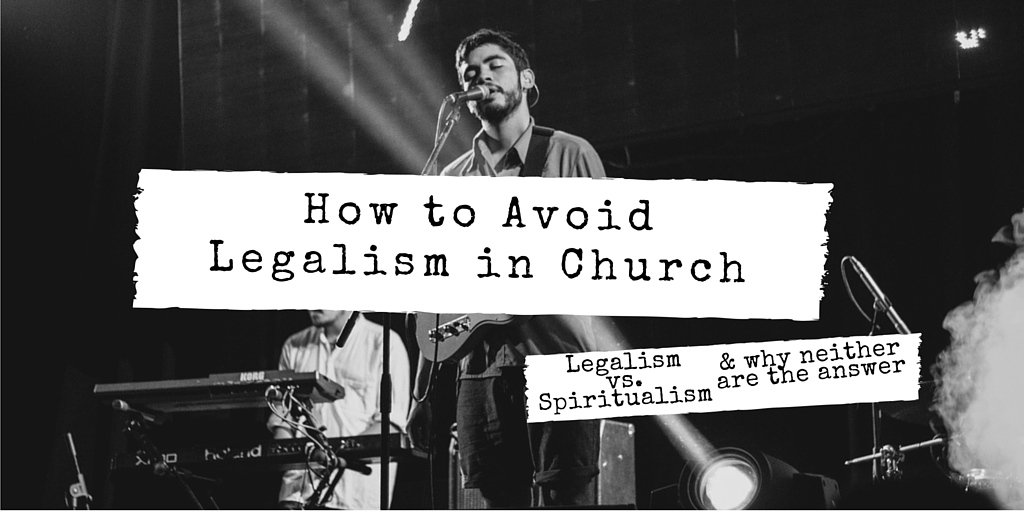
Many modern Christians have traded in legalism for spiritualism. The legalist emphasizes what you do externally. The spiritualist emphasizes your motivations, thoughts, and feelings that occur internally. Christians however, are supposed to focus on the inner and outer life.
The way to avoid legalism in Christianity is not to abandon good deeds in exchange for good motives. The way to avoid legalism in Christianity is to have good deeds with good motives, to obey God’s law out of a relational love for him.
Hyper-Spiritualism Is the Wrong Way to Avoid Legalism as a Christian
In response to a legalism that puts all the emphasis on the outer actions of man, many Christians have traded in legalism for a hyper-spiritualism, thus creating a movement within the American Church which emphasizes, above all things, the inner life.
The motivation of the heart has become the topic of conversation. Some church cultures have grown so “spiritual” and hip (anti-legal) that when good deeds are done, some members roll their eyes as if obeying the law is a form of immature Christianity because it is seen as “legalistic.” Reading the Bible, praying, fasting, becoming a faithful church member, participating in the sacraments, tithing, submitting to authority, and other normal means of grace seem so “straightedge” that cool, “non-legalistic Christians” show their maturity by not doing these things . . . with the right motive of course.
While legalism is a problem within Christianity, hyper-spirituality is not the solution. Since legalism is an emphasis on doing the right thing to earn good stuff rather than receive by grace gifts from God, many have turned their attention to the motives of the heart. This is right. God clearly tells us throughout the New Testament that good deeds without a good motive really are a dangerous combination within Christianity (Matthew 23). But the avoidance of good deeds is not the solution to legalism since good deeds are not the problem. Legalism occurs when we do good things with a bad motive. The motive is the problem; obeying the law is not the problem.
To avoid legalism in Christianity, you must continue to do good things commanded by God while doing them with the right motive.
In Christianity, Doing Bad With a Good Motive Is Just As Dangerous As Legalism
Sadly, in response to legalism in Christianity, those who have broken away from the normal patterns of biblical behavior are often elevated as the “really spiritual Christians.”
To cuss, to watch edgy movies, to sleep with your fiance “because you really love her,” or to wear the provocative clothing of the world is sometimes used to prove how spiritual a Christian really is, as if they are so close to God they know he doesn’t really care about these outer actions as long as the heart is right (which is often open to personal interpretation).
Biblical means of grace are abandoned by some with the thought of avoiding a legalistic Christianity based in outer actions emphasized by an older generation who wore suits and ties. With the explanation of avoiding a mindless religion of doing things their parents did “because that’s what you’re supposed to do,” some Christians feel the only thing that matters is if what they do, they do with the correct heart motive.
- If they are avoiding becoming an active church member who’s accountable to a real body of believers because they learn better from preachers they find online, since their motive seems right they never become a part of a real church.
- If they avoid reading the Bible consistently because they feel their heart connects with God better when they write poetry or listen to Christian songs alone in the morning, then their Bible remains on the shelf.
- If they build their closest friendships with people who don’t love Jesus contrary to what the Bible commands (2 Timothy 2:22), but they justify this by stating they are trying to help unbelievers, then their bonds with the world are deepened and their friendships with other believers is nonexistent.
- If they avoid tithing because they prayed about it and they feel God wants to bless them with a new car which they will use to help people, the tithe is never given.
- To divorce your husband because your motive is to find a better spiritual leader is equally as wrong to divorce your husband because you want to have sex with other people.
- To engage in homosexuality with the hope of really serving your partner is still a total rejection of God’s ways.
- To live with your girlfriend before marriage because you want to help her pay the bills is as equally wrong as living with someone for a more selfish reason.
Motives, the anti-legalist says, trump everything! This type of logic is very unbiblical and though different than legalism, it is just as dangerous as legalism in Christianity.
How to Avoid Legalism in Christianity: Don’t Be Appearance-Conscious
Clearly motives are important to God. He alone has the ability to weigh the heart as man looks at the outer life (1 Samuel 16:7); but this fact does not contradict the truth that faith without works is lifeless (James 2:18).
God does look at your heart but that doesn’t mean he has stopped looking at your outer actions too. A spirituality without an observable, outer holiness as defined in the Bible is dead and dangerous. 2 Timothy 3:2-10 explains that in the last days, people are going to pretend to be good but in actuality they will be very bad, for they will be an appearance-conscious people, “having the appearance of godliness, but denying its power. Avoid such people.”
Legalistic people are appearance-conscious by making sure their outer life appears holy. Hyper-spiritualistic people are appearance-conscious by making sure their inner life appears holy. Both have the “appearance of godliness,” and yet both lack real spiritual power to obey and love God through Jesus Christ.
God has defined for us in the Bible a way to live that leaves room for personal expression but which does not leave room for personal interpretation. If your attention to your motives is taking away from your observable godliness, you are fooling yourself, having a form of godliness but denying the real power of God which enables us to live according to his word.
Avoid Legalism in Christianity by Obeying the Bible Because You Love God
The right way to avoid legalism in Christianity is not to reject the law, but rather to correct the false motives present in your reasons for obeying the law. If the motive is the problem, fix the motive. The solution to legalism is not to indulge in an expression of easygoing sinfulness, and the solution to easy going sinfulness is not legalism. The way to be holy and free from legalism is to follow the law with the right motive to love God through the grace of Jesus Christ.
An inner spirituality without an outer holiness is a great way to do what you want without feeling bad about it. But true joy in the Lord comes only when we do the right things with the right motives. You need the outer and inner life consecrated to God if you desire to avoid legalism in Christianity.

Hi Mark. I want to thank you from the bottom of my heart for these writings. I learn so much from every single article. I always look forward to reading them. God has really blessed you with a beautiful gift. I do believe you are getting these words from the Holy Spirit. They are so true and definitely line up with scripture. They have been a real blessing to me. I include you and your family in my prayers daily.
By the way, your mom must be so proud of you right now. She’s a wonderful lady.
Wow, thank you so much for these very encouraging words. I’m so glad to hear this! And thank you for your prayers. What a blessing to be prayed for daily!
Thanks again and God bless,
Mark
PS: My mom just go done with a bike tour going from Seattle to Portland to raise awareness about human trafficking. Pretty cool….
Hey pastor, thanks for expressing your views. But I wanna express mine in a humble disagreeable manner. At some level in this article I’m in complete agreement with you, but some parts kinda shook my head.. You say that it reflects both inner and outer life, but the gospel emphasizes more on the inside and when that is clean the outside will be also.. Matthew 23:26
Thou blind Pharisee, cleanse first that which is within the cup and platter, that the outside of them may be clean also.
And you give a list of things that the hyper spiritualistic people avoid to show how they dont need external holiness.. One of them being not going to church or tithing even not studying the bible well first of all its not sinful to avoid church attendance or bible reading because nowhere in scripture are those laid out as divine law.. Also the bible is more of a collection of writings from different authors in various time spans all with different audfences shouldnt be labeled as the Word of God.. God wouldn’t lock someone out of heaven because they didn’t go to church or study there bible regularly.. Wouldn’t you agree??
Thanks so much for your respect even though you disagree. I value your thoughts and I respect you for how you have expressed your disagreements.
To answer your last question, I would agree that God would not lock someone out of heaven because they didn’t go to church or study their Bible. Salvation is through grace and faith alone. Only those who have put their faith in Jesus will be in heaven. Many who go to church and read their Bible daily will not be in heaven because they have not put their faith in Jesus.
However, I think we will disagree on what the Bible says and doesn’t say because while I agree that the Bible is a collection of writings gathered over a time span, I still believe the Bible is the authoritative word of God without error. I’m not sure if you believe that as well, but from the way you mentioned this it seems as though you mean we don’t have to take the Bible too seriously because of this.
Lastly, the Bible does command church attendance and regular Bible reading. By church attendance I don’t mean showing up to a building, but I mean the regular gathering and joining with other Christians who are sitting under elders who are preaching the word. Hebrews 10:24-25 for example states, “And let us consider how we may spur one another on toward love and good deeds, 25 not giving up meeting together, as some are in the habit of doing, but encouraging one another—and all the more as you see the Day approaching.”
For Bible reading, James 1:25 says, “But whoever looks intently into the perfect law that gives freedom, and continues in it—not forgetting what they have heard, but doing it—they will be blessed in what they do.”
My point in the article was certainly not to say that Bible reading and church attendance are what get you into heaven. But we must not then also say that things like this are now not important. While we must not base our salvation on our works, when we are truly saved by Jesus we will seek to obey the word of God. The balance I hope people get after reading the article is that we must obey God’s word because he has granted us grace, rather than say we don’t need to obey God now because we are saved by grace.
These articles might also help explain this point:
https://applygodsword.com/grace-faith-and-works/
https://applygodsword.com/grace-and-sanctification-gods-gifts-do-not-cancel-training/
Thanks again for your thoughts, God bless!
Mark